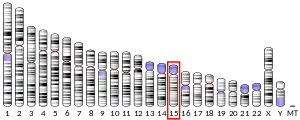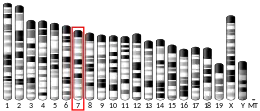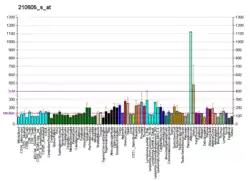MFGE8
Milk fat globule-EGF factor 8 protein (Mfge8), also known as lactadherin, is a protein that in humans is encoded by the MFGE8 gene.[5][6]
Species distribution
Mfge8 is a secreted protein found in vertebrates, including mammals as well as birds.
Function
MFGE8 may function as a cell adhesion protein to connect smooth muscle to elastic fibers in arteries.[7] An amyloid fragment of MFGE8 known as medin accumulates in the aorta with aging.[8] MFGE8 in the vasculature of adults can induce recovery from ischemia by facilitating angiogenesis.[9] It has been suggested that antagonizing MFGE8-induced angiogenesis could be a way of fighting cancer.[10]
MFGE8 contains a phosphatidylserine (PS) binding domain, as well as an Arginine-Glycine-Aspartic acid motif, which enables the binding to integrins. MFGE8 binds PS, which is exposed on the surface of apoptotic cells. Opsonization of the apoptotic cells and binding to integrins on the surface of phagocytic cells, mediates the engulfment of the dead cell.
References
- GRCh38: Ensembl release 89: ENSG00000140545 - Ensembl, May 2017
- GRCm38: Ensembl release 89: ENSMUSG00000030605 - Ensembl, May 2017
- "Human PubMed Reference:". National Center for Biotechnology Information, U.S. National Library of Medicine.
- "Mouse PubMed Reference:". National Center for Biotechnology Information, U.S. National Library of Medicine.
- "Entrez Gene: MFGE8 milk fat globule-EGF factor 8 protein".
- Collins C, Nehlin JO, Stubbs JD, Kowbel D, Kuo WL, Parry G (January 1997). "Mapping of a newly discovered human gene homologous to the apoptosis associated-murine mammary protein, MFG-E8, to chromosome 15q25". Genomics. 39 (1): 117–8. doi:10.1006/geno.1996.4425. PMID 9027496.
- Larsson A, Peng S, Persson H, Rosenbloom J, Abrams WR, Wassberg E, Thelin S, Sletten K, Gerwins P, Westermark P (June 2006). "Lactadherin binds to elastin--a starting point for medin amyloid formation?". Amyloid. 13 (2): 78–85. doi:10.1080/13506120600722530. PMID 16911961.
- Peng S, Glennert J, Westermark P (June 2005). "Medin-amyloid: a recently characterized age-associated arterial amyloid form affects mainly arteries in the upper part of the body". Amyloid. 12 (2): 96–102. doi:10.1080/13506120500107006. PMID 16011985.
- Silvestre JS, Théry C, Hamard G, Boddaert J, Aguilar B, Delcayre A, Houbron C, Tamarat R, Blanc-Brude O, Heeneman S, Clergue M, Duriez M, Merval R, Lévy B, Tedgui A, Amigorena S, Mallat Z (May 2005). "Lactadherin promotes VEGF-dependent neovascularization". Nat. Med. 11 (5): 499–506. doi:10.1038/nm1233. PMID 15834428.
- Raymond A, Ensslin MA, Shur BD (April 2009). "SED1/MFG-E8: a bi-motif protein that orchestrates diverse cellular interactions". J. Cell. Biochem. 106 (6): 957–66. doi:10.1002/jcb.22076. PMC 2742659. PMID 19204935.
Further reading
- Peterson JA, Scallan CD, Ceriani RL, Hamosh M (2002). "Structural and functional aspects of three major glycoproteins of the human milk fat globule membrane". Adv. Exp. Med. Biol. 501: 179–87. doi:10.1007/978-1-4615-1371-1_23. PMID 11787681.
- Larocca D, Peterson JA, Urrea R, et al. (1991). "A Mr 46,000 human milk fat globule protein that is highly expressed in human breast tumors contains factor VIII-like domains". Cancer Res. 51 (18): 4994–8. PMID 1909932.
- Maruyama K, Sugano S (1994). "Oligo-capping: a simple method to replace the cap structure of eukaryotic mRNAs with oligoribonucleotides". Gene. 138 (1–2): 171–4. doi:10.1016/0378-1119(94)90802-8. PMID 8125298.
- Couto JR, Taylor MR, Godwin SG, et al. (1996). "Cloning and sequence analysis of human breast epithelial antigen BA46 reveals an RGD cell adhesion sequence presented on an epidermal growth factor-like domain". DNA Cell Biol. 15 (4): 281–6. doi:10.1089/dna.1996.15.281. PMID 8639264.
- Collins C, Nehlin JO, Stubbs JD, et al. (1997). "Mapping of a newly discovered human gene homologous to the apoptosis associated-murine mammary protein, MFG-E8, to chromosome 15q25". Genomics. 39 (1): 117–8. doi:10.1006/geno.1996.4425. PMID 9027496.
- Aoki N, Ishii T, Ohira S, et al. (1997). "Stage specific expression of milk fat globule membrane glycoproteins in mouse mammary gland: comparison of MFG-E8, butyrophilin, and CD36 with a major milk protein, beta-casein". Biochim. Biophys. Acta. 1334 (2–3): 182–90. doi:10.1016/s0304-4165(96)00091-8. PMID 9101712.
- Taylor MR, Couto JR, Scallan CD, et al. (1997). "Lactadherin (formerly BA46), a membrane-associated glycoprotein expressed in human milk and breast carcinomas, promotes Arg-Gly-Asp (RGD)-dependent cell adhesion". DNA Cell Biol. 16 (7): 861–9. doi:10.1089/dna.1997.16.861. PMID 9260929.
- Suzuki Y, Yoshitomo-Nakagawa K, Maruyama K, et al. (1997). "Construction and characterization of a full length-enriched and a 5'-end-enriched cDNA library". Gene. 200 (1–2): 149–56. doi:10.1016/S0378-1119(97)00411-3. PMID 9373149.
- Giuffrida MG, Cavaletto M, Giunta C, et al. (1998). "Isolation and characterization of full and truncated forms of human breast carcinoma protein BA46 from human milk fat globule membranes". J. Protein Chem. 17 (2): 143–8. doi:10.1023/A:1022531500370. PMID 9535276.
- Newburg DS, Peterson JA, Ruiz-Palacios GM, et al. (1998). "Role of human-milk lactadherin in protection against symptomatic rotavirus infection". Lancet. 351 (9110): 1160–4. doi:10.1016/S0140-6736(97)10322-1. PMID 9643686.
- Peterson JA, Hamosh M, Scallan CD, et al. (1998). "Milk fat globule glycoproteins in human milk and in gastric aspirates of mother's milk-fed preterm infants". Pediatr. Res. 44 (4): 499–506. doi:10.1203/00006450-199810000-00006. PMID 9773837.
- Häggqvist B, Näslund J, Sletten K, et al. (1999). "Medin: an integral fragment of aortic smooth muscle cell-produced lactadherin forms the most common human amyloid". Proc. Natl. Acad. Sci. U.S.A. 96 (15): 8669–74. doi:10.1073/pnas.96.15.8669. PMC 17574. PMID 10411933.
- Oshima K, Aoki N, Kato T, et al. (2002). "Secretion of a peripheral membrane protein, MFG-E8, as a complex with membrane vesicles". Eur. J. Biochem. 269 (4): 1209–18. doi:10.1046/j.1432-1033.2002.02758.x. PMID 11856354.
- Hanayama R, Tanaka M, Miwa K, et al. (2002). "Identification of a factor that links apoptotic cells to phagocytes". Nature. 417 (6885): 182–7. doi:10.1038/417182a. PMID 12000961.
- Strausberg RL, Feingold EA, Grouse LH, et al. (2003). "Generation and initial analysis of more than 15,000 full-length human and mouse cDNA sequences". Proc. Natl. Acad. Sci. U.S.A. 99 (26): 16899–903. doi:10.1073/pnas.242603899. PMC 139241. PMID 12477932.
- Lee SH, Seo GS, Park PH, et al. (2003). "Increased expression of O-acetyl disialoganglioside synthase during rat liver fibrogenesis relates to stellate cell activation". Biochem. Biophys. Res. Commun. 303 (3): 954–61. doi:10.1016/S0006-291X(03)00448-0. PMID 12670504.
- Rehman KS, Yin S, Mayhew BA, et al. (2004). "Human myometrial adaptation to pregnancy: cDNA microarray gene expression profiling of myometrium from non-pregnant and pregnant women". Mol. Hum. Reprod. 9 (11): 681–700. doi:10.1093/molehr/gag078. PMID 14561811.
- Ota T, Suzuki Y, Nishikawa T, et al. (2004). "Complete sequencing and characterization of 21,243 full-length human cDNAs". Nat. Genet. 36 (1): 40–5. doi:10.1038/ng1285. PMID 14702039.
- Reches M, Gazit E (2005). "Amyloidogenic hexapeptide fragment of medin: homology to functional islet amyloid polypeptide fragments". Amyloid. 11 (2): 81–9. doi:10.1080/13506120412331272287. PMID 15478463.





